
4 minute read
Time to specialise. By Richard Lishman
TIME TO SPECIALISE
DENTAL TECHNOLOGY STUDENT (Part 2 of 10)
Advertisement
By Richard T Lishman I Managing Director of the 4dentists Group of companies
Award-winning Founder of The IFA’s - a specialist firm of Independent Financial Advisers that provides guidance and advice for some of the wealthiest individuals in the UK and around the globe, heads this series of editorials for lab technicians
In the first editorial of our lab technician series, our character, Bridget Crown, left university and took her first steps into a career as a dental lab technician. Part two looks at what happens when she decides to become a specialist and what this will mean for her finances.
Choosing a specialism
Let’s assume that Bridget Crown has been working successfully in a dental laboratory for a number of years now. She’s mastered the tricks of the trade, built an amazing repertoire of skills and has become a valued member of the team. But what’s next?
With so many avenues available for dental lab technicians, Bridget now needs to decide which area she’d like to specialise in. She can choose to become an orthodontic technician that focuses mainly on creating orthodontic appliances or she could instead opt to become a conservation technician and channel her skills towards creating crowns and bridgework. If neither of these options appeal, she could choose to become a prosthodontic technician and specialise in dentures, or even go more niche and become a maxillo-facial prosthetics technician and help reconstruct facial features of those who have had invasive surgery, injury or disease.
So, let’s imagine that Bridget has a passion for orthodontics and wants to become an orthodontic technician. Her initial move will be to complete the advanced qualifications needed and receive the necessary extra training to ensure that she has the skills and the qualifications for this new career direction.
The challenges and opportunities of change
Both training and advanced qualifications can be expensive, so depending on the current salary that Bridget is earning (which may have increased since she started due to more experience) and other factors such as her current lifestyle commitments, remaining student loan etc. Bridget may consider taking out a loan or finding some external funding. A loan, in particular, will have a significant impact on personal finances depending on the amount. Bridget will need advice about the best sort of loan for her, taking into consideration her current income, ability to repay money borrowed and the available interest rates.
Of course, specialising may also lead to Bridget moving to a new place of work if her current position can’t utilise her new skills. This will mean scouting for more niche positions and, ultimately, maybe even result in a house move again if she wants to secure a position and there are none in a commutable distance.
There are bright sides however, and once Bridget becomes a specialist, it’s likely that she will be earning a bit more, though this will depend on whether she chooses an NHS position or a private lab role. Currently, the average salary for an orthodontic technician in the UK seems to be around £50-65ki, though there is limited data, and some other sources suggest that these roles could be around the £33k mark instead.ii
Adjusting to a new lifestyle
Depending on the salary agreed in whatever new position Bridget finds, she could find herself with some considerable extra income. As such, this may be a good opportunity for her to pay off some of her student loan so that she has less debt, or even make big life steps such as saving up to buy a house. Her student loan repayments will begin/ increase according to her new salary and the repayment requirements. As such, let’s imagine that Bridget saved up for training and further qualifications, specialised, and is now earning £45k. This means that she will definitely be repaying her student loan each month – though luckily this will automatically be applied when her pay is calculated.
Bridget could also take this opportunity to think about protecting her new income. Although this was mentioned in the last entry to this series, now she’s earning more, Income Protection is likely to be a much more relevant option for her to consider, especially if she has chosen to save up for a property or pay off more of her student loan. She will also now have to consider new tax rates in her financial plans.
The IFA’s are here to help individuals with any questions they have about taking a step towards specialising and some of the financial challenges this may incur. Of course, everyone’s journey will be different, and depending on how technicians specialise, whether they need to move to a new lab, what their salary is and all manner of other variables, the figures mentioned in this article will change. But what about saving on tax? Make sure you read the next instalment to see how Bridget can make use of some tax reduction tips…
For more information, please call 0845 345 5060 or 0754 336 8478 or visit www.theifas.com
REFERENCES
i Glassdoor Orthodontic Technician Salaries. Link: https:// www.glassdoor.co.uk/Salaries/orthodontic-techniciansalary-SRCH_KO0,22.htm [Last accessed February 22]. ii Glassdoor. Orthodontic Technician Salaries. Link: https://www.glassdoor.co.uk/Salaries/orthodontic-dentaltechnician-salary-SRCH_KO0,29.htm [Last accessed February 22].














